2016 年 9 月公共英语三级考试真题
SECTION I Listening
( 25 minutes)
Directions:
This section is designed to lest your ability to understand spoken English.You will
hear a se-lection of recorded materials and you must answer the questions that
accompany them.There are two parts in this section,Part A and Part B.
Remember,while you are doing the test,you should first put down your answers in
your test booklet.At the end of the listening section,you will have 3 minutes to
transfer all your answers from your test booklet to your ANSWER SHEET.
If you have any questions,you may raise your hand no was you will not be allowed
to speak once the test has started.
Now look at PartAin your test booklet.
Part A
Directions:
You wll hear 10 short dialogues.For each dialogue,there is one question and four
possible
answers.Choose the correct answer—A,B,CorD,and mark it in your test booklet You
will have 15 seconds to answer the question and you wil hear each dialogue only once.
1.Where is George now?
[A] In America. [B] Here.
[C] In France [D] At home.
2.Where does this conversation probably take place?
[A] At a laundry. [B] At a supermarket.
[C] At a cafeteria. [D] At a movie theatre.
3.What does the man say about Tom?
�
[A] He has lost many of his paint gs.
[B] He has become a good person.
[C] His fortune has been good recently.
[D] He doesn't make good painting any longer.
4.What is the woman going to do?
[A] To go to another store.
[B] To go to the second floor for the coat.
[C] To buy herself a new coat.
[D] To go up to the third floor for the coat.
5.How does the woman think of the man's value?
[A] Modern. [B] Traditional
[C] Old-fashioned [D] Friendly.
6.Why does the woman want to keep the skirt?
[A] It fits her. [B] She likes it.
[C] It is a gift from the man [D] It is cheap.
7.What does the woman mean?
[A] The fresh air in the country is helpful to health.
[B] People can only feel relaxed when in the country.
[C] She has no time to goto the country.
[D] She is not willing to spend the weekend in the country.
8.What does the woman suggest Jerry do?
[A] Find another place to live.
[B] Sell his apartment to someone else.
[C] Start looking for someplace to live near the campus.
�
[D] Comeback to the campus.
9.Why did the man wakeup late this mom ing?
[A] Because he twisted his ankle the night before.
[B] Because the battery in his alarm clock had run out of electricity.
[C] Because his mother forgot to wake him up.
[D] Because he didn'the ar the a lamm clock.
10.What can we say about the man?
[A] It is the first time he has been in China.
[B] He likes China very much.
[C] Hc used to be a teacher in China.
[D] He is a youngman.
Part B
Directions:
You will hear four dialogues or monologues.Before listening to each one, you will
have 5 seconds to read each of the questions which accompany i.While listening,
answer each question by choosing A, B, CorD.After listening, you will have IO
seconds to check your answer to each question.You will hear the recording only once.
Questions 11-13 are based on the follow ig passage about the transportation in the
future.
11.What will be used to power cars in the next few decades?
[A] Gas. [B] Electricity.
[C] Solar energy. [D] Alcohol.
12.What will future news reports focus on when talking about transportation?
[A] Road conditions. [B] Highway traffic.
[C] Air traffic conditions. [D] New traf fc rules.
�
13.What will passengers be asked to do when they travel to the moon?
[A] Carry little luggage.
[B] Go through a healthcheck.
[C] Arrive 10 minutes earlier for boarding.
[D] Undergo security check.
Questions 14-17 are based on the following dialogue.
14.What is the main purpose of the man'strip?
[A] To improve his skating techniques.
[B] To climb mountains.
[C] To take a vacation.
[D] To learn to ski.
15.Why does the woman know so much about Albuquerque?
[A Because her sister lives there.
[B] Because she attends college there.
[C] Because she lives thirty miles from there.
[D] Because she had the vacation there last year.
16.What may cause most problems in Albuquerque, in the woman's opinion?
[A] The cold weather. [B] The low humidity
[C] The high altitude. [D] The changing climate.
17.What can be inferred about the man from the conversation?
[A] He has ever been to Albuquerque before.
[B] He has just graduated from college.
[C] He is going to New Mexico.
[D] He loves chess.
�
Questions 18-21 are based on the following dialogue between a doctor and his patient.
18.What's wrong with the woman?
[A] She has n't recovered from her illness.
[B] She can't have a good sleep.
[C] She has a headache.
[D] She can't understand the doctor.
19.What advice did the doctor give the woman?
[A] To take as many tablets as possible.
[B] To rest as much as possible.
[C] To do as much housework as possible
[D] To lie in bed until she feels better.
20.What made it difficult for the woman to follow the man's advice?
[A] She didn't want to lose her job
[B] She had to do housework
[C] She had to look after her children.
[D] Both Band C.
21.In what tone does the man talk to the woman?
[A] Sympathetic. [B] Scom ful.
[C] Cold [D] Firm
Questions 22-25 are based on the following passage about prisoners and prisons in
Britain.
22.In Britain, if a man commits some crime, what punishment will he probably get?
[A] He will be hanged
[B] He will be fined heavily.
�
[C] He will be sent to an open prison.
[D] He wil be ordered to do some community work
23.What do we know about women prisoners in Britain?
[A] Most of the mar every young.
[B] They are kept in closed prisons.
[C] Theydon't have freedom in prison
[D] They area small portion of the prison population
24.In what way are open prisons different from closed prisons?
[A] They have a longer history
[B] All of their prisoners are expected to work
[C] Their prisoners can visit their families and friends.
[D] Some of their prisoners are allowed to study or work outside prisons.
25.What dowel eam about prisoners in Britain from the passage?
[A] They live a comfortable life in prisons.
[B] Most of them get paid for their work
[C] They have to cook their own meals.
[D] They are locked up most of the t me.
You now have 3 minutes to transfer all your answers from your test booklet to your
ANSWER SHEET.
That is the end of listening section.
SECTIONⅡ Reading
( 50 minutes)
Part A
Directions:
�
Read the following two texts.Answer the questions on each text by choosing A, B,
CorD.Mark your answers on your ANSWER SHEET.
Text 1
Late last year, I needed to transport some furniture from our house in Sussex to
myson's flat in central London, I should have paid a man to do it for me, but
foolishly confident in my driving abi ity, I decided to hire a van and drive it
myself.It was a Ford Transit 280, long and wide; you couldn't see out of the back.You
never really knew how close you were to anything else on the road.
Reversing in my home yard, l crashed into a small shed, causing permanent damage.At
least I owned the shed.
I loaded up the fumiture and set out.By now it was rush hour.My nerves broke down,
as l steered the huge van through ever-shifting lanes, across oncoming vehicles,
between distances ofbuses, at last to Charlotte Street.
Here, I found an available parking space.As I reversed into it, I noticed three
people at a pavement cafe waving to me.I got out, trembling violently, like one
who has just endured a stormy Atlantic crossing.“You've shifted the car parked behind
you three feet, ”they said, and it belonged to a disabled person.I examined the
car.There were white scratches along is front bumper.It bore a disabled sign.So,
now I was a bad driver and a badman.Under the stem gaze of the three, I left an
apologetic note on the damaged car's windscreen, giving my phone number.
I unloaded the fumiture, dripping with sweat.Wanting only to escape the monster,
I drove the van back to its base on the Edgware Road.On arrival, the hire man told
me I must fill it up with petrol before retuming it.“Just charge me, ”I cried,
sill shaking with fear.He gazed at me with understanding.No doubt he'd witnessed
others in this state before.“How about I drive you to a petrol station, you fill
up, and I drive her back?”he asked.
He danced the great van through the traffic so casually that it would have shamed
me if I had not been so grateful.
26.The writer felt regretful that he had________.
[A] hired someone to drive for him [B] asked his son to do the delivery
[C] rented a small van for his goods [D] delivered the furniture himself
27.On his way to Charlotte Street, the writer felt________.
[A] frightened [B] annoyed [C] relaxed [D] excited
�
28.In the parking lot, the writer
[A] saw a disabled man [B] ran into his friends
[C] hit another vehicle [D] examined his van
29.The writer uses the word“monster”(para.5) to refer to
[A] the bad experience [B] the heavy fumi ture
[C] the guy at the base [D] the vehicle he drove
30.Watching the hire man drive, the writer felt
[A] doubtful [B] grateful [C] ashamed [D] worried
Text 2
By the time you retire, there's no doubt about it, your brain is n't what it used
to be.By 65,most people wil start to notice the signs:you forget people' s names
and the teapot occasionally
tums up in the fridge.
There is a good reason why our memories start to let us down.At this stage of lie,
we are steadily losing brain cells in critical areas.This is not too much of a problem
at fist; even in old age, the brain is flexible enough to compensate.At some point,
though, the losses start to make themselves felt.
Clearly, not everyone ages in the same way.so what's the difference between a happy,
intelli-gent old person and a forgetful, bad-tempered granny?And can we improve
our chances of becoming the former?
Exercise can certainly help.Numerous studies have shown that gentle exercise three
times a week can improve concentration and abstract reasoning in older people,
perhaps by encouraging the growth of new brain cells.Exercise also helps steady our
blood sugar.As we age, our blood sugar control worsens, which causes a large
increase in blood sugar levels.This can affect an area that helps form memories.Since
physical activity helps control blood sugar, getting out and about could reduce
these peaks and, potentially, improve your memory.
Coordination training could also help.Studies have shown that specifically
targeting motor control and balance improves learning function in 60 to
80-year-olds.
�
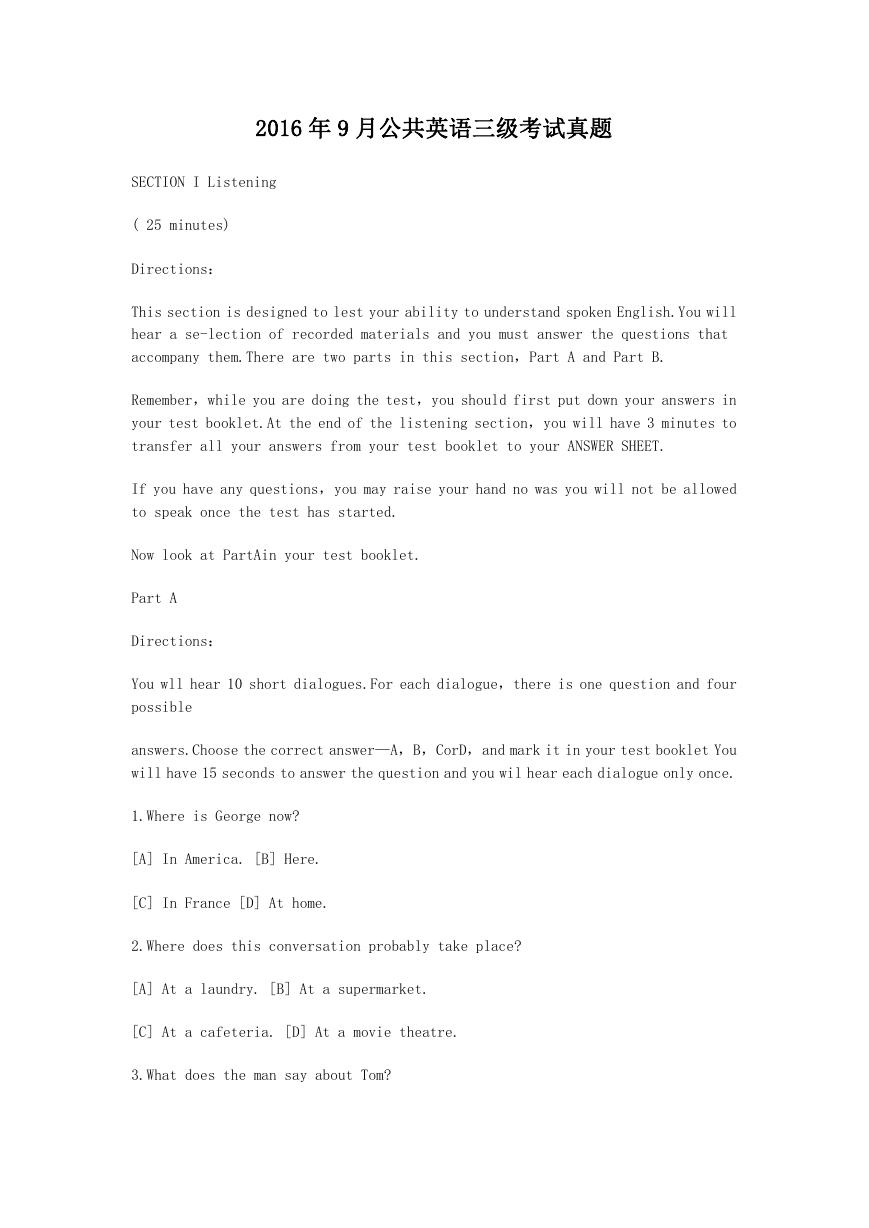
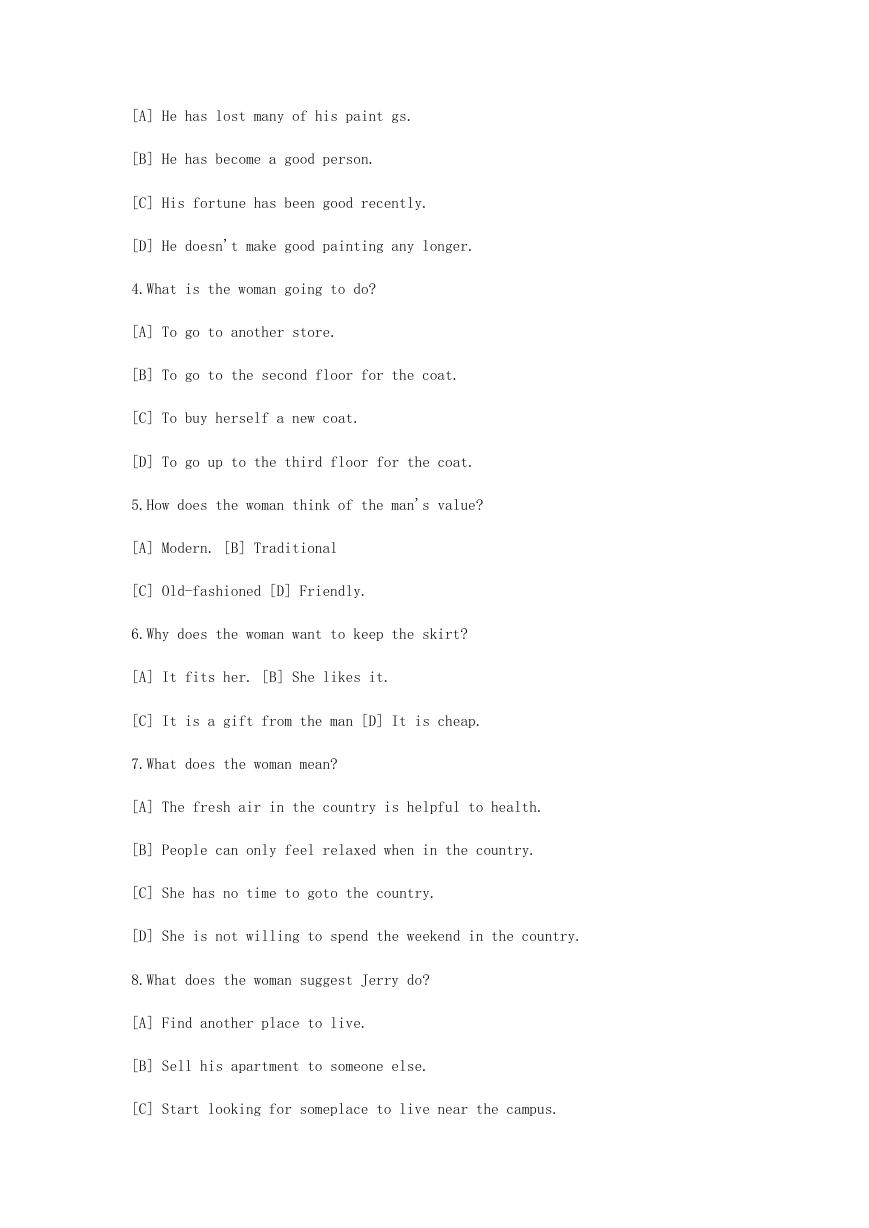
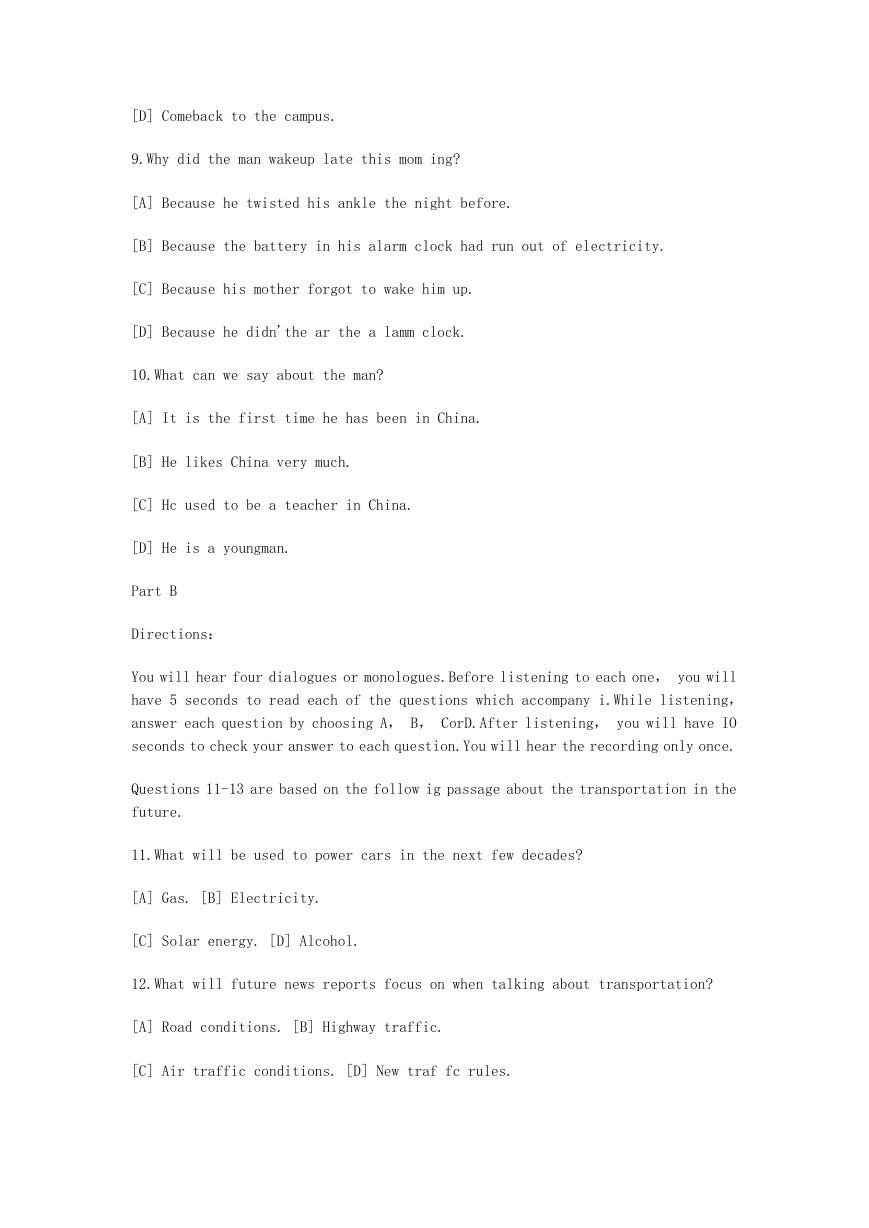
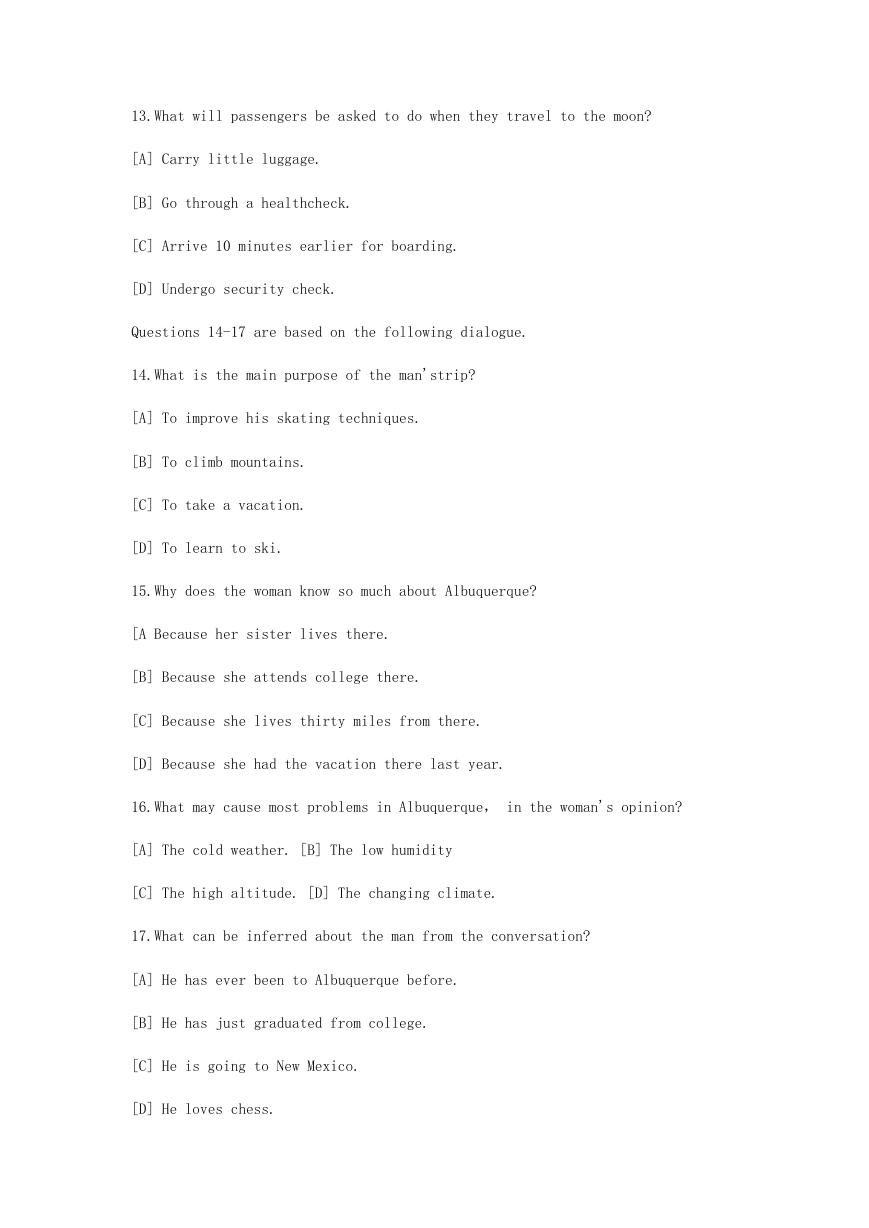
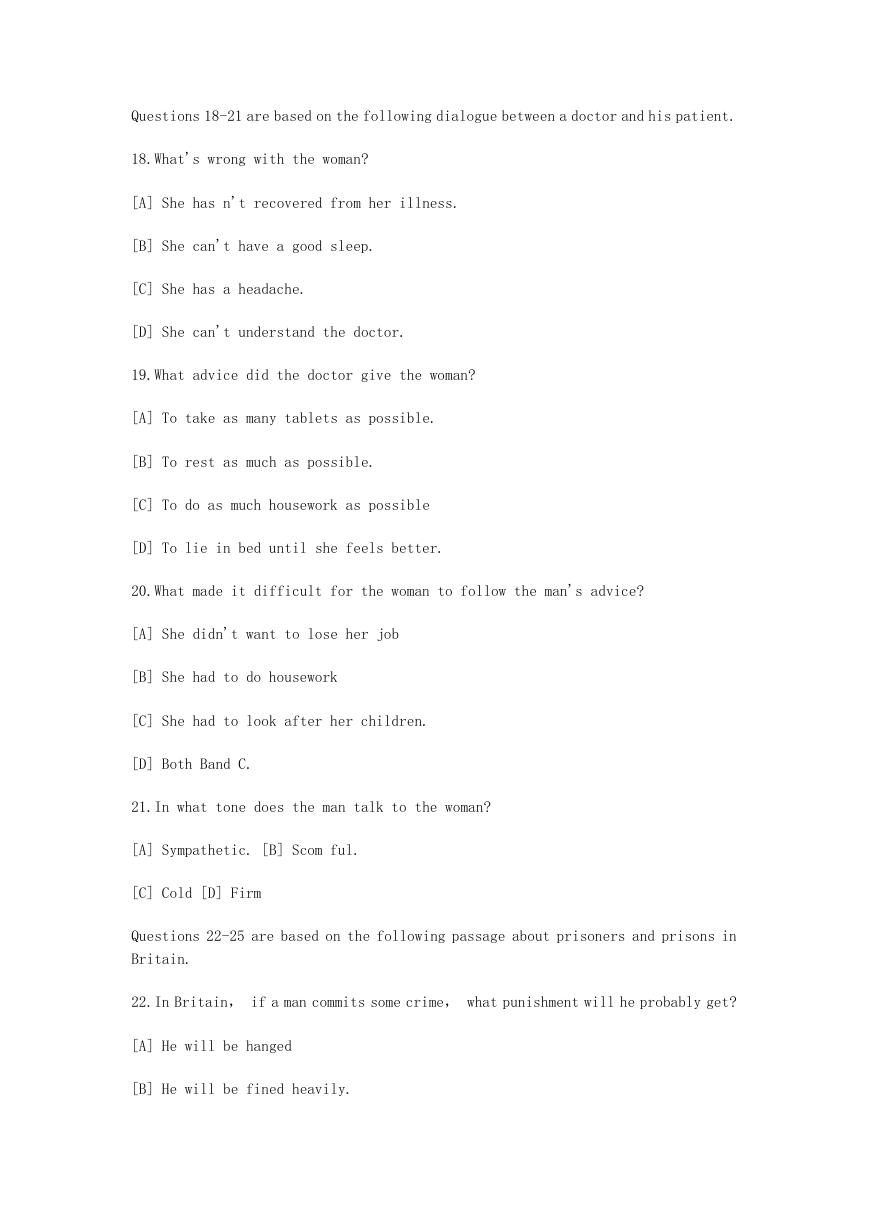
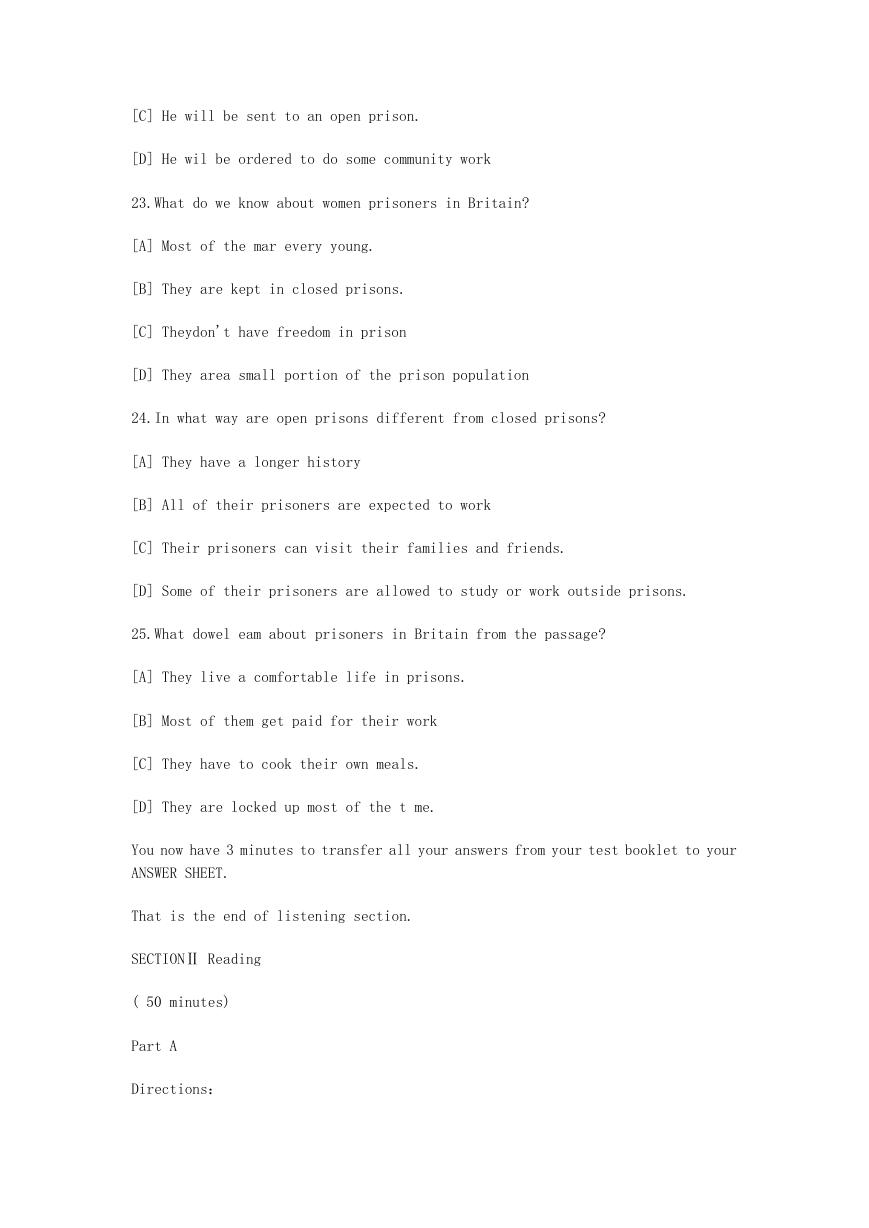
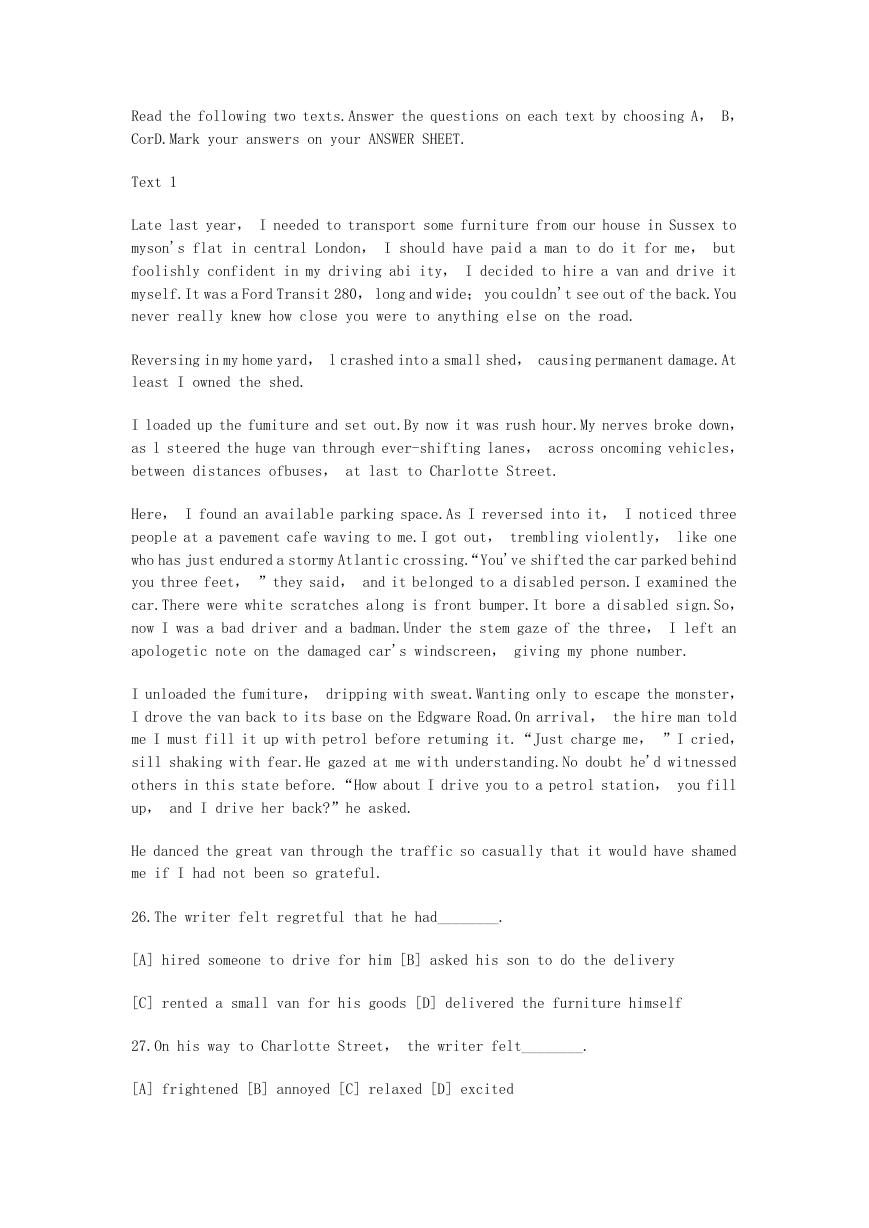
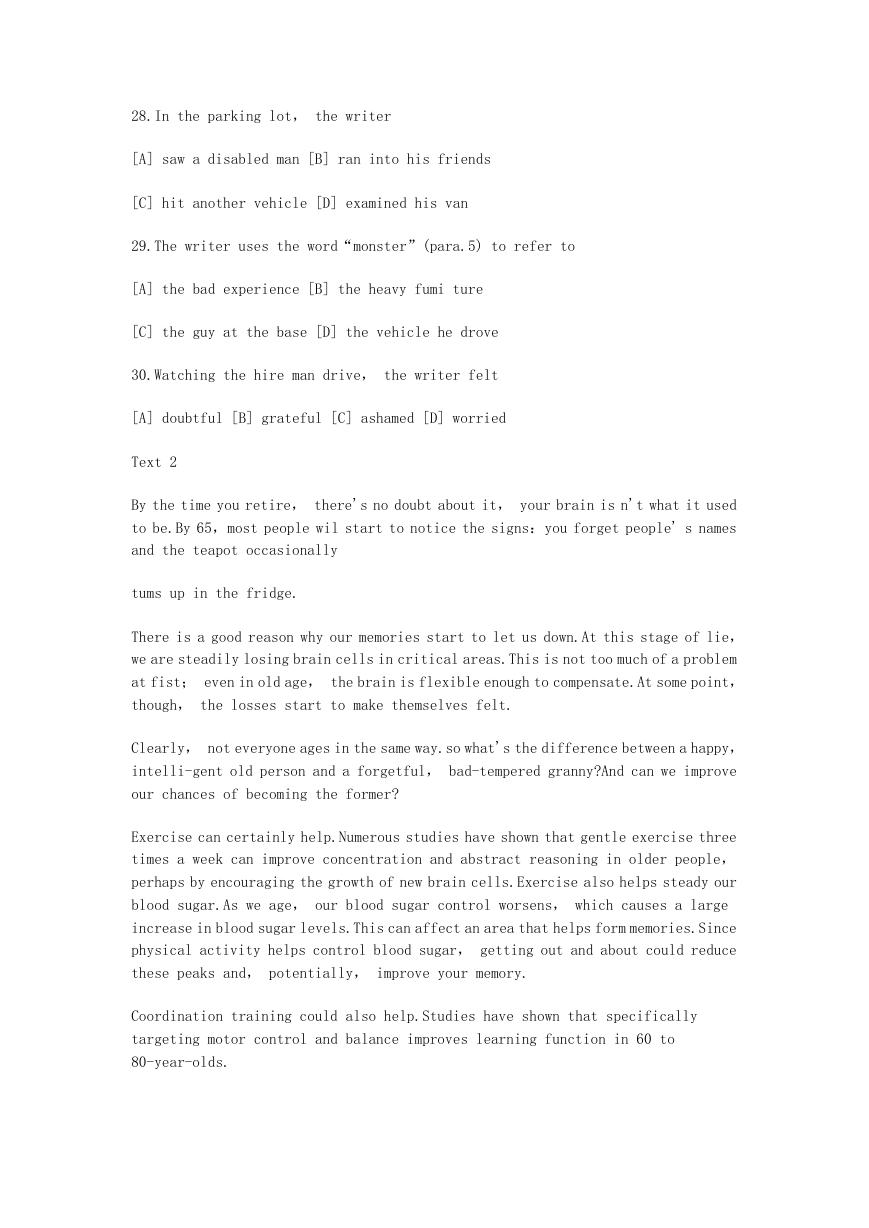








 2023年江西萍乡中考道德与法治真题及答案.doc
2023年江西萍乡中考道德与法治真题及答案.doc 2012年重庆南川中考生物真题及答案.doc
2012年重庆南川中考生物真题及答案.doc 2013年江西师范大学地理学综合及文艺理论基础考研真题.doc
2013年江西师范大学地理学综合及文艺理论基础考研真题.doc 2020年四川甘孜小升初语文真题及答案I卷.doc
2020年四川甘孜小升初语文真题及答案I卷.doc 2020年注册岩土工程师专业基础考试真题及答案.doc
2020年注册岩土工程师专业基础考试真题及答案.doc 2023-2024学年福建省厦门市九年级上学期数学月考试题及答案.doc
2023-2024学年福建省厦门市九年级上学期数学月考试题及答案.doc 2021-2022学年辽宁省沈阳市大东区九年级上学期语文期末试题及答案.doc
2021-2022学年辽宁省沈阳市大东区九年级上学期语文期末试题及答案.doc 2022-2023学年北京东城区初三第一学期物理期末试卷及答案.doc
2022-2023学年北京东城区初三第一学期物理期末试卷及答案.doc 2018上半年江西教师资格初中地理学科知识与教学能力真题及答案.doc
2018上半年江西教师资格初中地理学科知识与教学能力真题及答案.doc 2012年河北国家公务员申论考试真题及答案-省级.doc
2012年河北国家公务员申论考试真题及答案-省级.doc 2020-2021学年江苏省扬州市江都区邵樊片九年级上学期数学第一次质量检测试题及答案.doc
2020-2021学年江苏省扬州市江都区邵樊片九年级上学期数学第一次质量检测试题及答案.doc 2022下半年黑龙江教师资格证中学综合素质真题及答案.doc
2022下半年黑龙江教师资格证中学综合素质真题及答案.doc